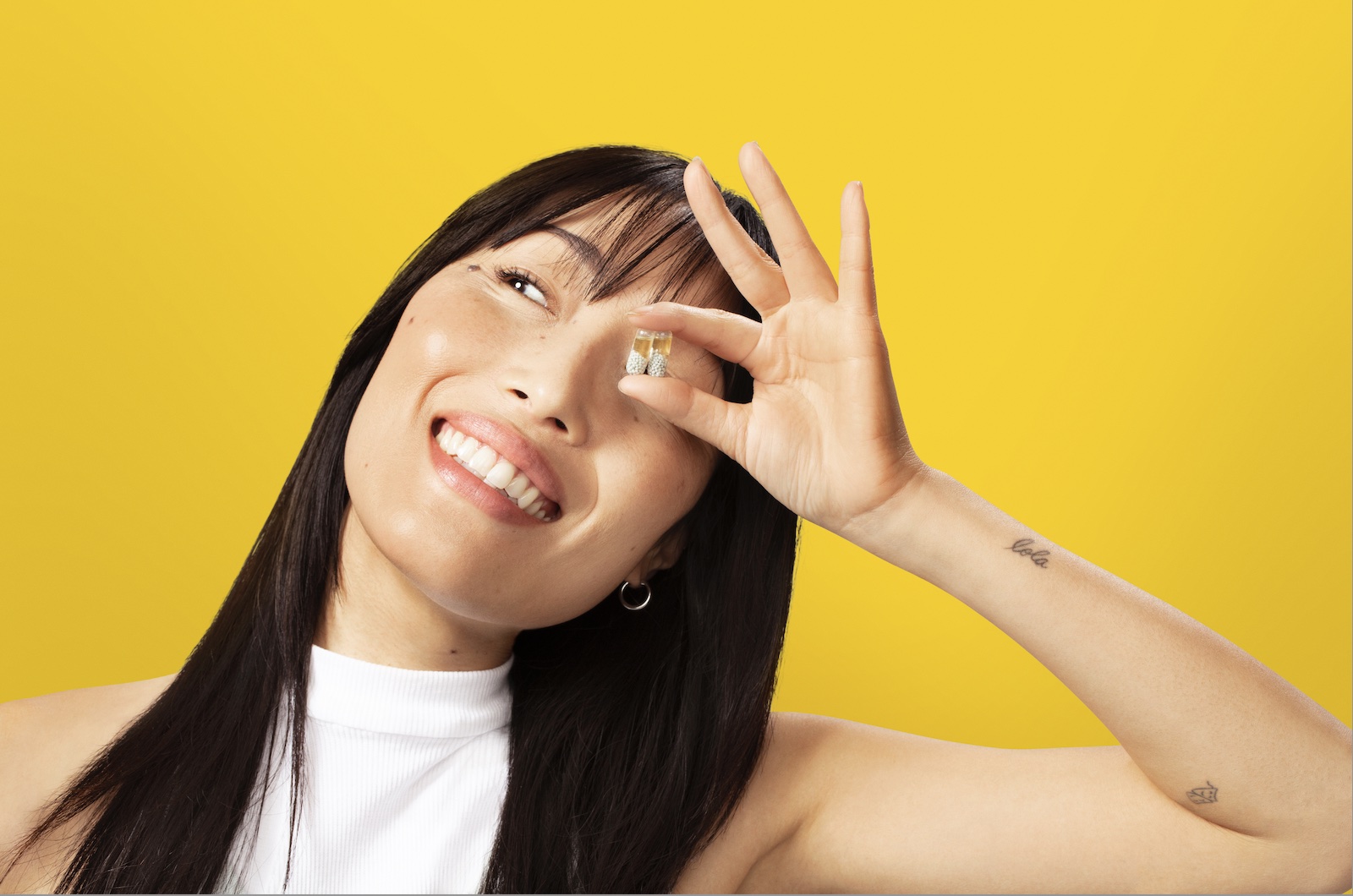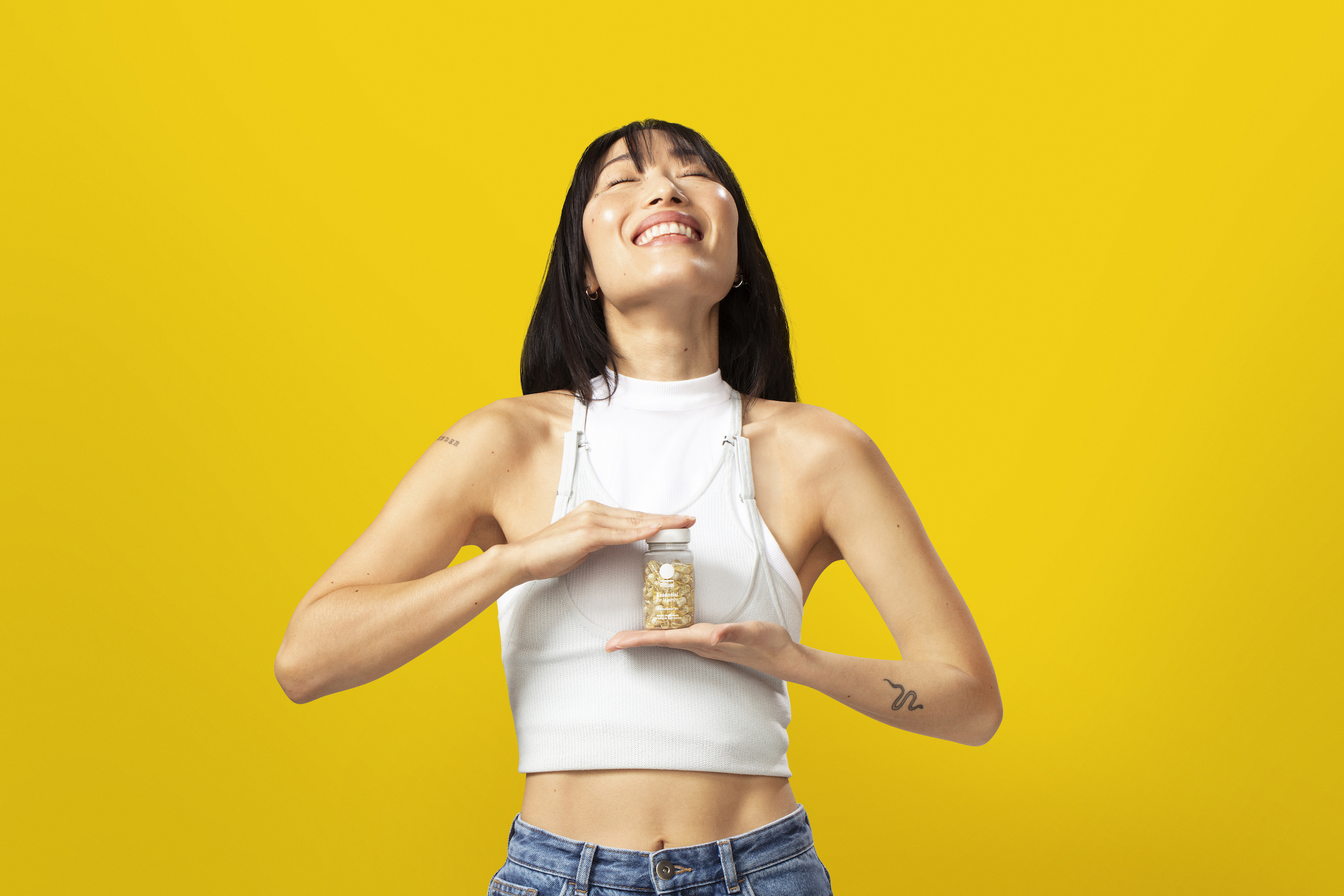


Young Chinese consumers are developing a taste for tasty, and healthy, vitamin supplements. Photo credit: Ritual
As the saying goes, an apple a day keeps the doctor away – at least it used to.
Fruit isn’t cutting it for China’s youngest generation of consumers, who would rather chew a vitamin gummy or pop a high-tech capsule to stay youthful and healthy.
In June, Generation Z consumers born after 1995 eclipsed shoppers in their 30s and 40s in terms of anti-aging purchases and searches on Alibaba Group’s B2C marketplace Tmall.
Health is trending, and companies in China are moving to catch the swell in demand with innovative products to keep pace with young consumers’ busy lifestyles.
“In terms of wellness awareness, Gen Z consumers woke up earlier than their parents,” Candice Wan, vice president of APAC cross-border e-commerce at German innovation and life sciences company Bayer, told Alizila.
And unlike their parents, tablespoons of cod liver oil and giant multi-vitamin capsules aren’t enough.
“Tablet-shaped vitamins make consumers feel like they are taking medicine, [and] makes it difficult for them to develop a long-time habit,” added Wan, who also heads Bayer’s domestic e-commerce operations in China.



Young shoppers demand tasty, convenient and straightforward products, and the company’s One A Day brand ticks these boxes with fruit-flavored gummy vitamins packed with 10 supplements.
More than 200,000 bottles of these gummies have sold in China since launching in 2019 – a better result than even the health-conscious American market, she noted.
Zoomers aren’t the only ones stocking up.
Searches for “anti-aging” as a whole rose 500% year on year in the first sales period of last month’s 6.18 Mid-Year Shopping Festival on Tmall.
Nationwide, consumers over the age of 55 accounted for 52% of all health-related purchases in 2021, according to think-tank EqualOcean Intelligence.
Meanwhile, consumers under 34, including Millennials born before 1988, constituted 34% of the health-related shopping force.
Take Your Pick
Companies young and old are flocking to take part in China’s health boom, from 159-year-old Bayer to a new generation of technology-powered health startups.
This includes U.S. newcomer supplement brand Ritual, which burst into China via Tmall this spring and has amassed a following amongst Gen Z and Millennial shoppers, with a quarter of buyers under 25.
“Our patented bead-in-oil design allows us to combine oily and dry ingredients in one capsule, which means consumers can get key nutrients like omega-3 DHA and vitamin D3 in just two capsules a day,” Joy Chua-Schwartz, Ritual’s vice president and business development director, shared in an interview with Alizila.
The company sources ingredients globally and develops the final product in stateside labs using patent-pending recipes that are tweaked to keep up with the latest medical studies.
“Seeking changes and innovations” is an integral part of life for supplement brands in this competitive field, according to Bayer’s Wan.
But newer is not necessarily always better. Modern supplements can complete, not compete, with traditional health regimes rooted in thousands of years of Chinese traditional medicine practice, according to the Chua-Schwartz.
“Anything you’re doing for your health can be done in parallel and can complement one another,” she said.
A Generation Apart
The range of brands in the supplement market is exceeded only by the diversity of consumer tastes and preferences expressed by China’s youngest shoppers.
Bayer and Ritual both see a growing focus on the origin and quality of ingredients, as consumers prioritize efficacy and take time to research and evaluate products.



“The confidence and knowledgeability of this generation of Chinese consumers is far beyond our imagination,” said Wan, who recalled how many people blindly bought imported products when she was growing up in the 1980s.
Nowadays, consumer expectations extend beyond the products themselves, as sustainability and environmental responsibility factor into Gen Z shopping decisions.
Ritual promotes a low-carbon lifestyle with its packaging using post-consumer recycled plastics rather than virgin plastics. The brand also packs its parcels with second-hand newspapers to go green.
“All of our work around sustainability resonates a lot with that younger generation,” said Chua-Schwartz.
It’s paying off. Ritual’s high-tech capsules have quickly gained traction in China, and around a quarter of purchases made during the mid-year shopping festival were by repeat buyers.
Likewise, Bayer’s One A Day brand saw 60% sales growth during this year’s 6.18 shopping festival, with the Gen Z customers accounting for 16.78% of the shopping force, according to Bayer.
Looking forward to this year’s 11.11 Global Shopping Festival, Bayer will roll out new products to attract more attention and interest to boost sales.





